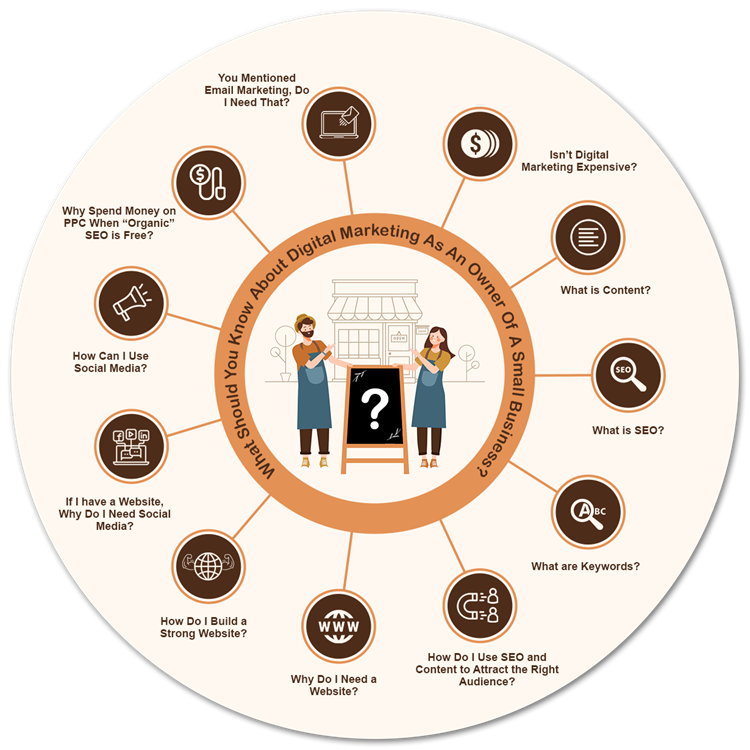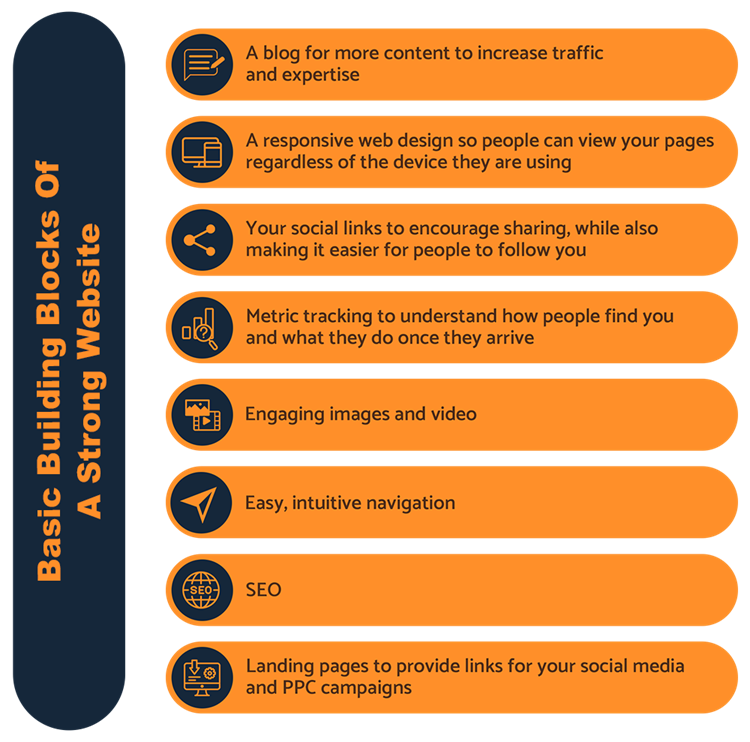Just because you have a small marketing budget, doesn’t mean you can’t make the most of your marketing campaigns. Point in fact: digital marketing. Digital marketing isn’t something only the big guys can afford. It is by far the most affordable option because you combine organic SEO efforts that are free, with very manageable digital paid for advertising like pay per click. The trick is knowing how to do things right. Here we look at what every small business owner needs to know about digital marketing.

Isn’t Digital Marketing Expensive?
Once you understand all the elements involved in digital marketing you’ll see most, if not all of these marketing options are well within your reach. Digital marketing entails anything you do online whether it is your website, emails, social media, “content” or different forms of online advertising. It can even be an app. Often small business owners see the shiny, expensive online efforts of major brands and figure it must be an expensive endeavor. However, it’s not. You can scale your digital marketing efforts to suit your budget and increase or decrease it depending on your needs.
What is Content?
Content can include a long list of things including the information presented on your blog, the basic pages of your website, videos, social media posts, podcasts, downloadable information like brochures or white papers, and more. All these elements are used together to boost your online presence and make it easier for people to find you, get to know you and hopefully become a customer. This is by far one of your most powerful online tools because it offers engaging information that allows you to connect with your audience. You leverage your own industry expertise to share valuable insights that help set you up as a trustworthy source.
The tone of your content is also key to developing a brand and providing brand awareness for your ideal audience. The recipe for strong content is originality, personality and substance to provide the type of information your audience will appreciate. However, these three things are also crucial to improving your search engine optimization (SEO) to increase your visibility with search engines, and in turn potential customers.
What is SEO?
SEO refers to a technique that optimizes your content to provide the information Google uses during any search. At the heart of SEO is keywords. However, the challenge is that Google doesn’t just depend on keywords to find the best content. Instead, they continue to create new algorithms based on a long list of criteria that ranges from things like a geolocation, to relevancy and from something as “random” as proper grammar to links to trusted resources.
It is close to impossible to figure out the secret world of SEO on your own because it takes both technical knowledge to understand the algorithms, in hand with a keen understanding of how to create the quality content Google will deem worthy of top ranking. The beauty of outstanding SEO is it provides what is called “organic” rankings that means your content alone drives people to your site so there is no cost associated with your efforts.
What are Keywords?
Ah yes, keywords. Keywords are the logical words people enter when searching for your product or service. While it used to be enough for a dental office to throw in a few terms like dentist, dental office, dental treatments, root canal, etc. into their content, today you need a keyword strategy. As mentioned above, the introduction of more and more complicated algorithms has made it necessary to expand SEO, so it includes not just keywords, but key phrases and “long tail” phrases that are better at putting a search into context.
How Do I Use SEO and Content to Attract the Right Audience?
It all starts by understanding the most important rules of SEO:
- Ensure your website is easy to use and filled with information relevant to your products, services, and expertise
- Provide original content
- Use both newsworthy content and “evergreen” content that has ageless information on your industry, products, and services
- Use an effective keyword strategy including meta description, title, and headlines
- Continue to create new content for all of your online efforts
- Combine organic and PPC to speed up your ranking improvements
If you get all of these things right, you can then depend on organic searches to generate more business and growth.
Why Do I Need a Website?
Your website is the home base for all your digital marketing efforts. All your online tactics are designed to send people to your website so they can start their customer journey and find their way to a sale. Your web presence offers all the information needed for people to learn more about you, find your products and services and take the steps you want them to take. This can include the obvious such as a quote request, product, or purchase, but can also involve many other ideal actions.
Marketing should have different purposes whether it is conversions, or simply having someone act to download a white paper, sign up for a newsletter or request a demo. With a well-designed, content-packed website you can achieve any of these marketing goals.
How Do I Build a Strong Website?
Some basics to follow when building or managing your website include:
- A blog for more content to increase traffic and expertise
- A responsive web design so people can view your pages regardless of the device they are using
- Your social links to encourage sharing, while also making it easier for people to follow you
- Metric tracking to understand how people find you and what they do once they arrive
- Engaging images and video
- Easy, intuitive navigation
- SEO
- Landing pages to provide links for your social media and PPC campaigns

These basics will help create the ideal website to engage and convert.
If I have a Website, Why Do I Need Social Media?
This is a fair point for small businesses with limited budgets. However, since social media is a free marketing tool and it boosts your SEO, it really is one of the best ways to drive traffic to your website. People need more than one way to find you, but also a more exciting way to interact with you. Social media provides a direct connection, in real-time that allows you to engage customers in a more meaningful way. It is like the gateway to your home base where people learn about you in digestible bites, but can then follow links to the most important web pages on your site.
It is the jumping-off point, while also keeping people informed of what’s new and important to them. It’s not just for promotions, but a way to build your brand, show off your social responsibility, entertain and also build trust. You create meaningful conversations your audience actively participates in, while providing a free marketing tool where shares can help expand your reach.
How Can I Use Social Media?
Honestly however you like! This is a tool with endless possibilities to share content, create conversations, live stream, sell, share, influence, partner, and more. The key to social media is remaining accessible and continuing to provide a steady stream of posts. Your goal is to find ways to engage your audience and create an online community where like-minded people can share experiences, preferably related to your product or service. You can solve problems, create new ways to send people to your site, and also even potentially become an influencer.
The more relevant the content, the more relevant you remain to your ideal customer. You also get better mileage out of your blog content as each new post should has a corresponding social post with a link to get people to follow your blog. It’s very symbiotic. And don’t forget to leverage the free analytics tools to understand where you are the most effective so you can improve audience engagement.
Why Spend Money on PPC When “Organic” SEO is Free?
Very good question. PPC is key especially when you are just starting to build your online presence. Organic SEO efforts take months to see results. This is not bad; it is actually good. Because what happens when you attack the SEO strategy properly is that you continuously gain momentum as your content becomes more robust. You remain a trusted source for your keywords and industry because Google sees there’s no funny business in your SEO tactics, and they continue to find interest in everything you post. Meanwhile, you need something to speed up the process.
The best way to do this is using PPC. PPC campaigns allow you to target your ideal audience and drive people wherever you choose whether it is products on your website, specific landing pages, or even your social pages. You reduce your competition for keywords by paying for the privilege to rank for the ones most important to you. With the right strategy, you can achieve top ranking consistently right above the organic search and drive traffic while building your online presence. Once you maintain top ranking organically you can pull back on the PPC and focus efforts on social and content.
Check out these stats by SmallBizGenius to know how PPC can be profitable for your business:
- Over 7 million advertisers invested a total of $10.01 billion into PPC ads in 2017.
- Brand awareness can be increased by up to 80% through Google paid ads.
- Paid advertising returns $2 for every $1 spent – a 200% ROI rate.
- 53% of paid clicks are made on mobile devices.
- Traffic brought through PPC advertising yields 50% more conversions than organic advertising.
You Mentioned Email Marketing, Do I Need That?
You don’t need it, but you want it. Email marketing is inexpensive and provides a constant reminder that you exist. An excellent PPC/social media campaign is driving people to a landing page to sign up for your newsletter or updates. This allows you to continue the nurturing process for both new arrivals and current customers. You maintain constant contact, so you communicate based on a specific person’s needs. If you have ecommerce, you can track behavior to tie their emails into specifics such as reminding them they have items in their shopping cart, or a special offer on a complimentary pair of shoes to go with the purse they just bought.
Check out these Email Marketing Stats by Hubspot:
- There are 3.9 billion daily email users
- 73% of millennials prefer communications from businesses to come via email.
- Marketers who use segmented campaigns note as much as a 760% increase in revenue.
- 78% of marketers have seen an increase in email engagement over the last 12 months
- 80% of business professionals believe that email marketing increases customer retention.
- 59% of respondents say marketing emails influence their purchase decisions.
Now that you understand digital marketing, you can see it takes some expert help to get you set up. For help with taking your business to the next level, contact Outreach Digital Marketing today.
